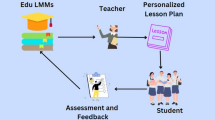Abstract
This study introduces CEWill-Auth, an AI-powered dialogue scenario authoring system that addresses critical challenges in language learning resource development. By integrating Large Language Models (LLMs) with structured interaction frameworks, the system enables educators to generate sophisticated dialogue scenarios across different proficiency levels. The research evaluates the system’s potential through interviews with language educators, demonstrating its capacity to create contextually nuanced, pedagogically aligned conversation scenarios. Key innovations include an intuitive authoring interface, interactive dialogue flow visualization, and adaptive content generation that maintains linguistic authenticity while supporting specific educational objectives.
Access this chapter
Tax calculation will be finalised at checkout
Purchases are for personal use only
Similar content being viewed by others
References
Ellis, R.: Task-Based Language Learning and Teaching. Oxford University Press, Oxford (2003)
Sato, M., Ballinger, S. (eds.): Peer Interaction and Second Language Learning: Pedagogical Potential and Research Agenda, vol. 45. John Benjamins Publishing Company (2016)
Golonka, E.M., Bowles, A.R., Frank, V.M., Richardson, D.L., Freynik, S.: Technologies for foreign language learning: a review of technology types and their effectiveness. Comput. Assist. Lang. Learn. 27(1), 70–105 (2014)
Kataoka, Y., Thamrin, A.H., Van Meter, R., Murai, J., Kataoka, K.: Investigating the effect of computer-mediated feedback via an LMS integration in a large-scale Japanese speaking class. Educ. Inf. Technol. 28(2), 1957–1986 (2023)
Ayedoun, E., Hayashi, Y., Seta, K.: Adding communicative and affective strategies to an embodied conversational agent to enhance second language learners’ willingness to communicate. Int. J. Artif. Intell. Educ. 29(1), 29–57 (2019)
Ayedoun, E., Hayashi, Y., Seta, K.: An authoring tool for task-oriented dialogue scenarios design in EFL context. Res. Pract. Technol. Enhanc. Learn. 18, 027 (2023)
Pérez-Marín, D.: Personalized language learning with artificial intelligence. In: Artificial Intelligence in Education: 22nd International Conference, AIED 2021, Utrecht, The Netherlands, Proceedings, Part I, vol. 12748, p. 385 (2021)
Bear, E., Chen, X., Souto, D.V., Ribeiro-Flucht, L., Rudzewitz, B., Meurers, D.: Designing a task-based conversational agent for EFL in German schools: student needs, actions, and perceptions. System 126, 103460 (2024)
Bradley, V.M.: Learning Management System (LMS) use with online instruction. Int. J. Technol. Educ. (IJTE) 4(1), 68–92 (2021)
Kojima, T., Gu, S.S., Reid, M., Matsuo, Y., Iwasawa, Y.: Large language models are zero-shot reasoners. In: Advances in Neural Information Processing Systems, vol. 35, pp. 22199–22213 (2022)
Groq. https://groq.com/. Accessed 05 Feb 2025
Acknowledgments
This research was supported by JSPS KAKENHI Grant Number #22K18011.
Author information
Authors and Affiliations
Corresponding author
Editor information
Editors and Affiliations
Ethics declarations
The authors declare no conflict of interests.
Rights and permissions
Copyright information
© 2025 The Author(s), under exclusive license to Springer Nature Switzerland AG
About this paper
Cite this paper
Ayedoun, E., Hayashi, Y., Seta, K. (2025). Enhancing L2 Learning Through AI-Powered Dialogue Scenario Generation: An Interactive Authoring System for Educators. In: Smith, B.K., Borge, M. (eds) Learning and Collaboration Technologies. HCII 2025. Lecture Notes in Computer Science, vol 15807. Springer, Cham. https://doi.org/10.1007/978-3-031-93567-1_2
Download citation
DOI: https://doi.org/10.1007/978-3-031-93567-1_2
Published:
Publisher Name: Springer, Cham
Print ISBN: 978-3-031-93566-4
Online ISBN: 978-3-031-93567-1
eBook Packages: Computer ScienceComputer Science (R0)




